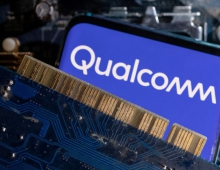
Qualcomm Confirms Plans to Seek For Alternative Foundries For 28nm Chips
Chip vendor Qualcomm on Wednesday confirmed that it was turning to other foundry suppliers amid a shortage of 28nm capacity at Taiwan Semiconductor Manufacturing Co. Ltd. (TSMC).
Qualcomm executives discussed the 28nm capacity shortage in a conference call with analysts after reporting sales and profit for its fiscal second quarter that exceeded analysts' expectations.
"Although the manufacturing yields are progressing per expectation, there's a shortage of 28-nanometer capacity," said Paul Jacobs, Qualcomm's chairman and CEO. He added that Qualcomm could not secure enough 28nm capacity and that the constraints to supply are expected to limit Qualcomm's revenue potential this year.
Shang-yi Chiang, executive vice president at TSMC, recently confirmed the foundry's 28nm node has faced problems related to capacity.
Jacobs added that Qualcomm was engaging with "several alternative sources" for 28nm capacity. Possibilities would presumably include UMC, Globalfoundries and Samsung.
Qualcomm reported sales of $4.94 billion for the quarter ended March 25, up 6 percent from the previous quarter and up 28 percent compared to the year-ago quarter. The company reported a net income of $2.33 billion, up 59 percent from the previous quarter and up 117 percent from the year ago quarter.
"I am pleased to report another quarter of record revenues and earnings per share, driven by strong demand for 3G- and 4G-enabled devices across both developed and emerging regions," Jacobs told investors. "We are excited to see the continued growth of 3G and 4G smartphones, as well as new mobile computing devices. We are increasing our operating expenses to facilitate additional 28 nanometer supply and to continue to position our industry-leading chipset solutions for the opportunities ahead," he addd.
"Although the manufacturing yields are progressing per expectation, there's a shortage of 28-nanometer capacity," said Paul Jacobs, Qualcomm's chairman and CEO. He added that Qualcomm could not secure enough 28nm capacity and that the constraints to supply are expected to limit Qualcomm's revenue potential this year.
Shang-yi Chiang, executive vice president at TSMC, recently confirmed the foundry's 28nm node has faced problems related to capacity.
Jacobs added that Qualcomm was engaging with "several alternative sources" for 28nm capacity. Possibilities would presumably include UMC, Globalfoundries and Samsung.
Qualcomm reported sales of $4.94 billion for the quarter ended March 25, up 6 percent from the previous quarter and up 28 percent compared to the year-ago quarter. The company reported a net income of $2.33 billion, up 59 percent from the previous quarter and up 117 percent from the year ago quarter.
"I am pleased to report another quarter of record revenues and earnings per share, driven by strong demand for 3G- and 4G-enabled devices across both developed and emerging regions," Jacobs told investors. "We are excited to see the continued growth of 3G and 4G smartphones, as well as new mobile computing devices. We are increasing our operating expenses to facilitate additional 28 nanometer supply and to continue to position our industry-leading chipset solutions for the opportunities ahead," he addd.





















